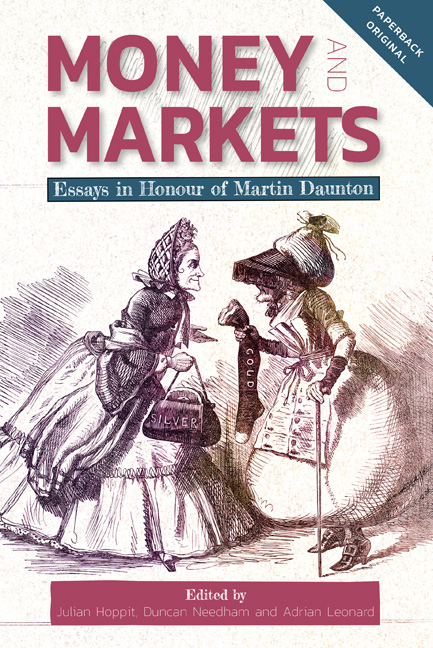Book contents
- Frontmatter
- Contents
- List of Figures
- List of Tables
- List of Contributors
- List of Abbreviations
- Introduction
- 1 Taxing London and the British Fiscal State, 1660–1815
- 2 Rents, Squalor, and the Land Question: Progress and Poverty
- 3 Marine Insurers, the City of London, and Financing the Napoleonic Wars
- 4 The Political Economy of Sir Robert Peel
- 5 Champagne Capitalism: France’s Adaptation to Britain’s Global Hegemony, 1830–80
- 6 The 1848 Revolution in Prussia: a Financial Interpretation
- 7 Imperial Germany, Great Britain and the Political Economy of the Gold Standard, 1867–1914
- 8 Knowledge, Contestation and Authority in the Eurodollar Market, 1959–64
- 9 Continuity and Change in British Conservative Taxation Policy, c. 1964–88
- 10 Britain Since the 1970s: a Transition to Neo-Liberalism?
- 11 Maplin: the Treasury and London’s Third Airport in the 1970s
- 12 Workfare and the Reinvention of the Social in America and Britain, c. 1965 to 1985
- 13 Charity and International Humanitarianism in Post-War Britain
- 14 Discounting Time
- 15 The Material Politics of Energy Disruption: Managing Shortages Amidst Rising Expectations, Britain 1930s–60s
- The Published Writings of Martin J. Daunton
- Index
- People, Markets, Goods: Economies and Societies in History ISSN: 2051-7467
14 - Discounting Time
Published online by Cambridge University Press: 13 April 2021
- Frontmatter
- Contents
- List of Figures
- List of Tables
- List of Contributors
- List of Abbreviations
- Introduction
- 1 Taxing London and the British Fiscal State, 1660–1815
- 2 Rents, Squalor, and the Land Question: Progress and Poverty
- 3 Marine Insurers, the City of London, and Financing the Napoleonic Wars
- 4 The Political Economy of Sir Robert Peel
- 5 Champagne Capitalism: France’s Adaptation to Britain’s Global Hegemony, 1830–80
- 6 The 1848 Revolution in Prussia: a Financial Interpretation
- 7 Imperial Germany, Great Britain and the Political Economy of the Gold Standard, 1867–1914
- 8 Knowledge, Contestation and Authority in the Eurodollar Market, 1959–64
- 9 Continuity and Change in British Conservative Taxation Policy, c. 1964–88
- 10 Britain Since the 1970s: a Transition to Neo-Liberalism?
- 11 Maplin: the Treasury and London’s Third Airport in the 1970s
- 12 Workfare and the Reinvention of the Social in America and Britain, c. 1965 to 1985
- 13 Charity and International Humanitarianism in Post-War Britain
- 14 Discounting Time
- 15 The Material Politics of Energy Disruption: Managing Shortages Amidst Rising Expectations, Britain 1930s–60s
- The Published Writings of Martin J. Daunton
- Index
- People, Markets, Goods: Economies and Societies in History ISSN: 2051-7467
Summary
I first heard of Martin Daunton in 1983 during a postgraduate research seminar chaired by Theo Barker at the LSE. Discussion turned to the Post Office, and someone mentioned that Martin was writing its history. Even then the mention of Martin's name carried a quiet authority with it, with no one in the room doubting that what Martin wrote would be of the highest quality. Yet, because I was not the most outgoing of creatures, I was not to meet Martin until 2006. Sitting in a hostel in Dali, China in January 2006 and, as one does, checking through my university email, I noticed an invitation from Martin to give a paper to the modern economic and social history seminar at Cambridge. I accepted the invitation, and so began the first of several happy visits to stay with Martin and Claire at Trinity Hall. Later that same year, Martin and I both gave papers to a UK–Russian seminar on state and industry relations at the International Economic History Congress in Helsinki. In 2009 I began work on the final volume of the Oxford economic and social history of Britain, to which Martin had already contributed two volumes, as well as being the general editor of the series. Throughout the long process of writing my volume, Martin endured sporadic bursts of email from me on topics ranging from John Hicks and what became the IS/LM model, to the likely rates of return on the technology shares gathered together in the Scottish Mortgage investment trust. Throughout, Martin has remained good humoured, well-informed and highly perceptive, qualities which abound in his writing.
This chapter examines one of the main concerns of the fifth volume of the Oxford economic and social history of Britain, which I am currently finishing. Its concern is with time, and in particular with the increasing use of ‘discounting’ over time by post-World War II UK governments in their approach to the management of public expenditure. While other approaches to the accommodation of the future, such as insurance, take precautions to mitigate the risk and magnitude of contingent future events, the practice of discounting differs in valuing not the risk and its cost, but instead the income and the returns from the future in terms of the present.
- Type
- Chapter
- Information
- Money and MarketsEssays in Honour of Martin Daunton, pp. 251 - 262Publisher: Boydell & BrewerPrint publication year: 2019



